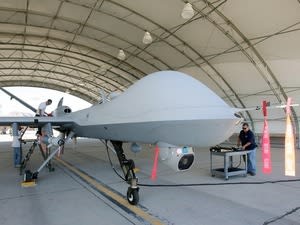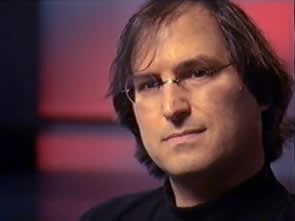Drone Pilots: The Future Of Aerial Warfare
無人機パイロット: 航空戦の未来
by Rachel Martin
ますます戦争がゲーム感覚になっていく恐怖

Ethan Miller/Getty Images
Unmanned aerial vehicles, like this Predator (shown here in 2009 during training at Creech Air Force Base in Indian Springs, Nev.), make up the fastest growing segment of the U.S. Air Force.
このプレデターのような無人航空機は米空軍のなかで急速に重要な位置を占めつつある。(写真は、2009年ネバダ州、インディアン・スプリングスのクリーチ空軍基地で訓練中のプレデター)
November 29, 2011
To understand how important remotely piloted aircraft are to the U.S. military, consider this: The U.S. Air Force says this year it will train more drone pilots than fighter and bomber pilots combined.
米軍の中で遠隔操縦航空機が如何に重要かを理解するには、次のことを考えれば理解できる。即ち米空軍は今年、戦闘機、爆撃機のパイロットの数を合わせた数より多い、無人機パイロットを訓練しているという事実だ。
And that's changing the nature of aerial warfare — and the pilots who wage it.
ということは航空戦の性質と、それを遂行するパイロットの意味が変わりつつあるということである。
Steve, a lieutenant colonel, grew up wanting to be in the Air Force. And that meant one thing: wanting to be a pilot.
空軍中佐のスティーブは、子供のころから空軍を希望していた。 その意味するところは明確である。パイロットになりたかったのである。
To him, flying is physical: the pull of gravity, the sounds inside the cockpit.
彼にとって、空を飛ぶと言うことは物理的な意味合いにおいてである。つまり重力に抗して、コクピットで飛翔の音を感じているということだ。
"You hear those things, you feel those things, and you react to them as you need to," he says.
「そういう音を聴き、そういう感覚に浸り、そして必要に応じて、それらに対処していくのさ。」と彼は言う。
Steve joined the Air Force in 1997 and started out flying F-15s. But he quickly started to see signs that his world was changing. When he was given a chance to fly drones, he took it.
スティーブは1997年に空軍に入隊し、F-15から経験した。 しかし、彼はすぐに、これから向かう世界が変わっていく兆候に気が付いた。 だから、無人機を飛ばすチャンスが訪れたとき、すぐにその道を選択したのだ。
Now, he is at Holloman Air Force Base in New Mexico helping the Air Force build a different kind of pilot.
今、彼はニューメキシコのホローマン空軍基地に勤務して、空軍が、これまでと異なるパイロットを養成する仕事に着手している。
The biggest training center of its kind in the United States, Holloman has become the primary training ground for pilots who fly unmanned aerial vehicles, or drones.
この種の訓練センターとして最大のホローマン基地は、無人機を操縦するパイロットの為の主要な地上訓練基地となった。
There, pilots learn to fly the MQ-1 Predator and the MQ-9 Reaper, two of the military's most important weapons systems. These remotely controlled planes can hover in the air 24 hours at a time, collecting intelligence or carrying out a strike in Afghanistan.
そこでは、パイロットは、空軍で最も重要な兵器システムである二つのMQ-1プレデターとMQ-9リーパーの操縦を学ぶ。 これらの遠隔操縦機は24時間空中に留まることができ、アフガニスタンにおいて情報を収集したり、航空攻撃を遂行できる。

One of the reasons for the shift to unmanned aircraft has been fighter jet budget cuts. Here, a pilot climbs into a U.S. F-16 at Al Asad Air Base in Iraq on Nov. 1. 無線航空機への移行の理由の一つは、戦闘機予算の削減だ。 この写真はイラクのアル・アサド空軍基地のNO.1でF-16に搭乗しているパイロット。
But the pilots are thousands of miles away, sitting in front of a bank of computer screens. And that distance, which is the strength of the program, has also created unique challenges.
しかし、そのパイロットは航空機からは何千マイルも離れたところで、コンピュータスクリーンの壁面に向かって座っているのだ。 そして、この離隔距離が、この作戦の強みもであり、また新たな独自の困難性を生み出すのである。
Training For Remote Warfare 遠隔戦争のための訓練
The student pilots at Holloman begin their training in simulator bays — small rooms jam-packed with computer processors and monitors. It's there that they first get their hands on the remote controls.
ホローマン基地で訓練を受けるパイロットはシュミレータの囲みのなかで訓練を始める・・・そこは多くのモニターとコンピュータのプロセッサーがぎっしりと並ぶ小さな部屋だ。 この部屋で訓練生は初めて遠隔操縦の操作を学ぶ。
At their workstations, the student pilot sits on the left, the sensor operator — the person who monitors the aircraft and weapons systems — on the right. An instructor loads in images of Afghanistan and gives the assignment: The pilots, sitting in New Mexico, are to fly a drone over Afghanistan, providing an escort for Humvees.
このワークステーションで、訓練生のパイロットは左側に着席し、センサーオペレータと呼ばれる無人機と兵器システムを監視する教官が右に座る。 ここで教官がアフガニスタンの画像情報を表示して、任務を付与する。 即ちパイロットは、ニューメキシコに居ながらにして、アフガニスタン上空を、ハムビーを護衛しながら、無人機で飛行することになる。
"They're going to scan the route ... that they're supposed to travel on and see if there's any threats to that convoy," an instructor named Matt explains.
「彼らは、そのルートをスキャンしながら、飛行を続けることにより、その車両縦隊の先に敵の脅威が無いかどうかを偵察するのです。」とマックスと呼ばれる教官が説明する。
Matt, like Steve and every other instructor and student at Holloman Air Force Base, are identified only by rank and first name to help protect their identity because of the "sensitive nature" of the remotely piloted aircraft mission, the Air Force says.
スティーブや他の教官や訓練生と同様にマイクも、ホローマン空軍基地ではファーストネームと階級だけで呼ばれる。これは、この遠隔操縦無人機の任務の「センシティブな性質上」彼らの防護上、彼らを特定できないようにするためである。
The training program at Holloman started in 2009. Slowly, service members started volunteering to fly the Predator drone.
このホローマン基地での訓練プログラムは2009年に開始された。 そして次第に、このプレデターの操縦を志願する兵士が増えてきたのだ。
There are two big reasons for the shift. The first was the Sept. 11 attacks: America's borderless war on al-Qaida catapulted drone technology onto the front lines.
この空軍の戦略のシフトには二つの大きな理由がある。 1つは9月11日のテロだ。 つまり、アメリカが国境の無いアルカイダというテロとの戦いに向かう中で、この無人機技術が最前線に引きずり出されたということ。
The second reason has been budget cuts: Air Force fighter pilots started to see their squadrons disappear. That's what happened to another lieutenant colonel named Mike. Until a year ago, he was an F-15 pilot. Now, he's also an instructor at Holloman.
2つめは、予算の削減である。 空軍の戦闘パイロットは徐々に自分たちの飛行隊が縮小していくのを経験していた。 それはもう一人の中佐、マイクにとっても同様だった。 1年前までは、彼はF-15戦闘機のパイロットだったのだが、今や、彼はホローマン基地で教官をしている。
"I felt with the F-15 drawdown that that community was closing up, and there'd be more opportunity but also a chance to be part of the fastest growing part of the Air Force," Mike says.
「私はF-15戦闘機が削減され、それに伴う一連の部隊が解散する予感がした。そしてその方向性は加速するだろうが、同時に空軍で急成長する部隊へのチャンスも訪れるとも感じた。」とマイクは話す。

Mechanics prepare an MQ-9 Reaper for a training flight, Aug. 8, 2007, at Creech Air Force Base in Indian Springs, Nev. 2007年8月8日、訓練飛行のためMQ-9リーパーを整備兵が準備している。(ネバダ州インディアン・スプリングのクリーチ空軍基地)
Now, the challenge for Mike, Steve and other instructors at Holloman is to convince students that when they're operating drones, they are flying real airplanes.
ホローマン基地のマイクやスティーブのような教官にとって、一番難しい課題は訓練生に、彼らが無人機を操縦している時に、彼らが本当に航空機で実際に飛んでいるのだということを認識させることである。
A Cultural Divide カルチャーギャップ
After the student pilots have mastered the simulator, they move on to ground control stations out on the tarmac. From these metal rectangular storage containers, the student pilots control Predators and Reapers out on test runs.
訓練生のパイロット達がシミュレーターに習熟すると、彼らはターマックの地上コントロールステーションに移動する。 この金属の四角いコンテナのような施設から、訓練生たちはプレデターやリーパーのテスト飛行を操縦する。
A shift can go for hours, until another team comes to relieve them.
次のグループが引き継ぐまで、訓練は数時間に及ぶ。
Further out on the flight line sits one of the test planes, the MQ-9 Reaper.
飛行航路の離れたところに、テスト用の無人機MQ-9リーパーが置いてある。
Training can be the only time drone pilots actually see the planes they'll fly, says Steve, the instructor.
訓練は、無人機操縦士が実際に、自分たちが飛ばす無人機を見る唯一の機会だと教官のスティーブは話す。
"You normally just walk out to the container and you sit down and you fly, but you don't actually see this, and you're physically dislocated from where it's at," he says.
「通常、このコントロールステーションに向かい、操縦席に座り、無人機を操縦するが、訓練生は実際にこの無人機を見ることはない。 操縦士は、無人機がいるところから物理的に隔絶されている。」と彼は言う。
Until recently, most drone operators were regular Air Force pilots. Now, the service is reaching out to people who've never even flown before. And that has caused friction within the Air Force as it tries to redefine what it means to be a pilot.
つい最近まで、殆どの操縦士は、通常の空軍パイロットがやっていた。 しかし、今は、この任務職種は戦闘機を操縦したことがない人々にも広がっている。 そして、これが空軍内での摩擦の原因になっており、空軍は、無人機パイロットの再定義を迫られている。
"There's a cultural divide," says Kelly, a 46-year-old Air Force reservist from Texas who is now a student at Holloman. Kelly grew up wanting to be a fighter pilot, but his vision is not good enough for that job. But he can fly drones. And he says that irks fighter pilots who see themselves at the top of the Air Force pyramid.
「カルチャーギャップがある。」と46歳のテキサス州の予備役で、現在訓練を受けているケリーは言う。 ケリーは戦闘機のパイロットを目指してきたが、彼の視力がその任に耐えなくなったが、無人機の操縦はできる。 そして、このことが、空軍のピラミッド状のヒエラルキーの頂点に立っていると意識している戦闘機乗りをイラつかせるという。
"Part of it is an ego ... I hate to say an ego trip, but it is," he says.
「それはエゴの一部だけど・・・利己的な振る舞いだというのは嫌だけど、実際そうだから」と彼は言う
The Air Force has been working to bridge the divide between these two groups of fliers. First off, drone operators are called pilots, and they wear the same green flight suits as fighter pilots, even though they never get in a plane. Their operating stations look like dashboards in a cockpit.
空軍はこの二つに分かれたパイロット達の溝を埋めるのに腐心している。 まず、最初に、無人機の操縦士はパイロットと呼ばれます。そして彼らは、実際に航空機に搭乗しないけれども、同じグリーンの、パイロットと同じフライトスーツを着用し、彼らの操縦ステーションは、あたかもコックピットのダッシュボードような使用になっている。
But all of that has made tensions worse. Aaron is another Holloman student. He used to fix military communications equipment; now he's training to operate drones.
しかし、このような対策をもってしても関係は改善しなかった。 アーロンもホローマン基地の訓練生だが、彼は軍の通信装置の整備兵だったが、今は無人機を操縦している。
"There's still a lot of animosity. You see people in a conventional aircrew that wonder why we get to wear the flight suits even though we don't leave the ground, why do we need flight physicals, why do we get incentive pay — stuff like that," he says.
「まだ、我々に対する悪感情は消えてないね。 これまで通常の飛行部隊の連中は、我々が、地上にいるのに、同じフライトスーツを着用しているのを良く思わないし、我々に航空適性は必要ないと考えているし、なぜ飛行手当をもらえるんだと思っているよ。 例えて言えばそんなことさ。」と彼は説明する。
Distance Between Pilot And Plane パイロットと無人機の離隔距離
Steve and Mike, the former fighter pilots turned drone instructors, say the Air Force is going through a cultural change. It all goes back to the distance drones create — between the pilot and his plane. It's something Steve is still trying to make sense of for himself.
元パイロットで無人機の教官になったスティーブとマイクは、空軍は空軍文化の変革期を迎えているという。 それは、無人機が生み出した離隔距離に行きつく・・・つまりパイロットと航空機の離隔。 それはスティーブ自身も実感として感得しようと努力していることでもある。
"That distance and that separation is there that prevents you from feeling that piece of the airplane, or maybe being as one with the airplane. But what it also does is take the risk out of you flying the airplane, so you don't have to worry about being shot down," he says.
「航空機(無人)との距離と離隔により、我々はもはや自分を航空機の一部、或いは航空機と共にある存在と考えられなくなっている。 しかし、そのことは同時に我々を航空機を操縦するときのリスクから解放し、撃墜される心配をしなくて済むようになった。」と彼は言う
So the very thing that protects these pilots — not being in the cockpit — is what makes them wonder if they're really pilots.
だから、このパイロットを守ってくれる、まさにそのこと(コクピットに居なくて済む)が、彼らを「自分たちは本当にパイロットなのだろうか」と考え込ませている。
Outside, an F-22 flies overhead — a plane with a fighter pilot in the cockpit. Fighter jets do fly out of Holloman. It helps remind new pilots like Kelly how they are supposed to think of themselves when they're flying a drone.
外では、頭上をF-22が飛んでいる・・・・・戦闘機パイロットがもちろんコクピットに搭乗している飛行機だ。 ホローマン基地からジェット戦闘機が飛び立っている。 その光景を見るたびに、ケリーのような新しいカテゴリ‐のパイロット達に、無人機を操縦している時自分たちはどのように考えたらいいのだろうと思う。
"I felt like I was actually flying an airplane. I mean, I actually am flying an airplane," he says.
「私は実際に飛行機を操縦していると感じている。 実際、私は飛行機を操縦しているのだから」
At least that's what he has to tell himself each time he sits at a computer, operating a plane thousands of miles away that he has never seen.
少なくとも、彼は、コンピュータに向かって座り、決して彼が目にしない数千マイルも離れた無人機を操縦するときに自分自身に言い聞かせている。
無人機パイロット: 航空戦の未来
by Rachel Martin
ますます戦争がゲーム感覚になっていく恐怖

Ethan Miller/Getty Images
Unmanned aerial vehicles, like this Predator (shown here in 2009 during training at Creech Air Force Base in Indian Springs, Nev.), make up the fastest growing segment of the U.S. Air Force.
このプレデターのような無人航空機は米空軍のなかで急速に重要な位置を占めつつある。(写真は、2009年ネバダ州、インディアン・スプリングスのクリーチ空軍基地で訓練中のプレデター)
November 29, 2011
To understand how important remotely piloted aircraft are to the U.S. military, consider this: The U.S. Air Force says this year it will train more drone pilots than fighter and bomber pilots combined.
米軍の中で遠隔操縦航空機が如何に重要かを理解するには、次のことを考えれば理解できる。即ち米空軍は今年、戦闘機、爆撃機のパイロットの数を合わせた数より多い、無人機パイロットを訓練しているという事実だ。
And that's changing the nature of aerial warfare — and the pilots who wage it.
ということは航空戦の性質と、それを遂行するパイロットの意味が変わりつつあるということである。
Steve, a lieutenant colonel, grew up wanting to be in the Air Force. And that meant one thing: wanting to be a pilot.
空軍中佐のスティーブは、子供のころから空軍を希望していた。 その意味するところは明確である。パイロットになりたかったのである。
To him, flying is physical: the pull of gravity, the sounds inside the cockpit.
彼にとって、空を飛ぶと言うことは物理的な意味合いにおいてである。つまり重力に抗して、コクピットで飛翔の音を感じているということだ。
"You hear those things, you feel those things, and you react to them as you need to," he says.
「そういう音を聴き、そういう感覚に浸り、そして必要に応じて、それらに対処していくのさ。」と彼は言う。
Steve joined the Air Force in 1997 and started out flying F-15s. But he quickly started to see signs that his world was changing. When he was given a chance to fly drones, he took it.
スティーブは1997年に空軍に入隊し、F-15から経験した。 しかし、彼はすぐに、これから向かう世界が変わっていく兆候に気が付いた。 だから、無人機を飛ばすチャンスが訪れたとき、すぐにその道を選択したのだ。
Now, he is at Holloman Air Force Base in New Mexico helping the Air Force build a different kind of pilot.
今、彼はニューメキシコのホローマン空軍基地に勤務して、空軍が、これまでと異なるパイロットを養成する仕事に着手している。
The biggest training center of its kind in the United States, Holloman has become the primary training ground for pilots who fly unmanned aerial vehicles, or drones.
この種の訓練センターとして最大のホローマン基地は、無人機を操縦するパイロットの為の主要な地上訓練基地となった。
There, pilots learn to fly the MQ-1 Predator and the MQ-9 Reaper, two of the military's most important weapons systems. These remotely controlled planes can hover in the air 24 hours at a time, collecting intelligence or carrying out a strike in Afghanistan.
そこでは、パイロットは、空軍で最も重要な兵器システムである二つのMQ-1プレデターとMQ-9リーパーの操縦を学ぶ。 これらの遠隔操縦機は24時間空中に留まることができ、アフガニスタンにおいて情報を収集したり、航空攻撃を遂行できる。

One of the reasons for the shift to unmanned aircraft has been fighter jet budget cuts. Here, a pilot climbs into a U.S. F-16 at Al Asad Air Base in Iraq on Nov. 1. 無線航空機への移行の理由の一つは、戦闘機予算の削減だ。 この写真はイラクのアル・アサド空軍基地のNO.1でF-16に搭乗しているパイロット。
But the pilots are thousands of miles away, sitting in front of a bank of computer screens. And that distance, which is the strength of the program, has also created unique challenges.
しかし、そのパイロットは航空機からは何千マイルも離れたところで、コンピュータスクリーンの壁面に向かって座っているのだ。 そして、この離隔距離が、この作戦の強みもであり、また新たな独自の困難性を生み出すのである。
Training For Remote Warfare 遠隔戦争のための訓練
The student pilots at Holloman begin their training in simulator bays — small rooms jam-packed with computer processors and monitors. It's there that they first get their hands on the remote controls.
ホローマン基地で訓練を受けるパイロットはシュミレータの囲みのなかで訓練を始める・・・そこは多くのモニターとコンピュータのプロセッサーがぎっしりと並ぶ小さな部屋だ。 この部屋で訓練生は初めて遠隔操縦の操作を学ぶ。
At their workstations, the student pilot sits on the left, the sensor operator — the person who monitors the aircraft and weapons systems — on the right. An instructor loads in images of Afghanistan and gives the assignment: The pilots, sitting in New Mexico, are to fly a drone over Afghanistan, providing an escort for Humvees.
このワークステーションで、訓練生のパイロットは左側に着席し、センサーオペレータと呼ばれる無人機と兵器システムを監視する教官が右に座る。 ここで教官がアフガニスタンの画像情報を表示して、任務を付与する。 即ちパイロットは、ニューメキシコに居ながらにして、アフガニスタン上空を、ハムビーを護衛しながら、無人機で飛行することになる。
"They're going to scan the route ... that they're supposed to travel on and see if there's any threats to that convoy," an instructor named Matt explains.
「彼らは、そのルートをスキャンしながら、飛行を続けることにより、その車両縦隊の先に敵の脅威が無いかどうかを偵察するのです。」とマックスと呼ばれる教官が説明する。
Matt, like Steve and every other instructor and student at Holloman Air Force Base, are identified only by rank and first name to help protect their identity because of the "sensitive nature" of the remotely piloted aircraft mission, the Air Force says.
スティーブや他の教官や訓練生と同様にマイクも、ホローマン空軍基地ではファーストネームと階級だけで呼ばれる。これは、この遠隔操縦無人機の任務の「センシティブな性質上」彼らの防護上、彼らを特定できないようにするためである。
The training program at Holloman started in 2009. Slowly, service members started volunteering to fly the Predator drone.
このホローマン基地での訓練プログラムは2009年に開始された。 そして次第に、このプレデターの操縦を志願する兵士が増えてきたのだ。
There are two big reasons for the shift. The first was the Sept. 11 attacks: America's borderless war on al-Qaida catapulted drone technology onto the front lines.
この空軍の戦略のシフトには二つの大きな理由がある。 1つは9月11日のテロだ。 つまり、アメリカが国境の無いアルカイダというテロとの戦いに向かう中で、この無人機技術が最前線に引きずり出されたということ。
The second reason has been budget cuts: Air Force fighter pilots started to see their squadrons disappear. That's what happened to another lieutenant colonel named Mike. Until a year ago, he was an F-15 pilot. Now, he's also an instructor at Holloman.
2つめは、予算の削減である。 空軍の戦闘パイロットは徐々に自分たちの飛行隊が縮小していくのを経験していた。 それはもう一人の中佐、マイクにとっても同様だった。 1年前までは、彼はF-15戦闘機のパイロットだったのだが、今や、彼はホローマン基地で教官をしている。
"I felt with the F-15 drawdown that that community was closing up, and there'd be more opportunity but also a chance to be part of the fastest growing part of the Air Force," Mike says.
「私はF-15戦闘機が削減され、それに伴う一連の部隊が解散する予感がした。そしてその方向性は加速するだろうが、同時に空軍で急成長する部隊へのチャンスも訪れるとも感じた。」とマイクは話す。

Mechanics prepare an MQ-9 Reaper for a training flight, Aug. 8, 2007, at Creech Air Force Base in Indian Springs, Nev. 2007年8月8日、訓練飛行のためMQ-9リーパーを整備兵が準備している。(ネバダ州インディアン・スプリングのクリーチ空軍基地)
Now, the challenge for Mike, Steve and other instructors at Holloman is to convince students that when they're operating drones, they are flying real airplanes.
ホローマン基地のマイクやスティーブのような教官にとって、一番難しい課題は訓練生に、彼らが無人機を操縦している時に、彼らが本当に航空機で実際に飛んでいるのだということを認識させることである。
A Cultural Divide カルチャーギャップ
After the student pilots have mastered the simulator, they move on to ground control stations out on the tarmac. From these metal rectangular storage containers, the student pilots control Predators and Reapers out on test runs.
訓練生のパイロット達がシミュレーターに習熟すると、彼らはターマックの地上コントロールステーションに移動する。 この金属の四角いコンテナのような施設から、訓練生たちはプレデターやリーパーのテスト飛行を操縦する。
A shift can go for hours, until another team comes to relieve them.
次のグループが引き継ぐまで、訓練は数時間に及ぶ。
Further out on the flight line sits one of the test planes, the MQ-9 Reaper.
飛行航路の離れたところに、テスト用の無人機MQ-9リーパーが置いてある。
Training can be the only time drone pilots actually see the planes they'll fly, says Steve, the instructor.
訓練は、無人機操縦士が実際に、自分たちが飛ばす無人機を見る唯一の機会だと教官のスティーブは話す。
"You normally just walk out to the container and you sit down and you fly, but you don't actually see this, and you're physically dislocated from where it's at," he says.
「通常、このコントロールステーションに向かい、操縦席に座り、無人機を操縦するが、訓練生は実際にこの無人機を見ることはない。 操縦士は、無人機がいるところから物理的に隔絶されている。」と彼は言う。
Until recently, most drone operators were regular Air Force pilots. Now, the service is reaching out to people who've never even flown before. And that has caused friction within the Air Force as it tries to redefine what it means to be a pilot.
つい最近まで、殆どの操縦士は、通常の空軍パイロットがやっていた。 しかし、今は、この任務職種は戦闘機を操縦したことがない人々にも広がっている。 そして、これが空軍内での摩擦の原因になっており、空軍は、無人機パイロットの再定義を迫られている。
"There's a cultural divide," says Kelly, a 46-year-old Air Force reservist from Texas who is now a student at Holloman. Kelly grew up wanting to be a fighter pilot, but his vision is not good enough for that job. But he can fly drones. And he says that irks fighter pilots who see themselves at the top of the Air Force pyramid.
「カルチャーギャップがある。」と46歳のテキサス州の予備役で、現在訓練を受けているケリーは言う。 ケリーは戦闘機のパイロットを目指してきたが、彼の視力がその任に耐えなくなったが、無人機の操縦はできる。 そして、このことが、空軍のピラミッド状のヒエラルキーの頂点に立っていると意識している戦闘機乗りをイラつかせるという。
"Part of it is an ego ... I hate to say an ego trip, but it is," he says.
「それはエゴの一部だけど・・・利己的な振る舞いだというのは嫌だけど、実際そうだから」と彼は言う
The Air Force has been working to bridge the divide between these two groups of fliers. First off, drone operators are called pilots, and they wear the same green flight suits as fighter pilots, even though they never get in a plane. Their operating stations look like dashboards in a cockpit.
空軍はこの二つに分かれたパイロット達の溝を埋めるのに腐心している。 まず、最初に、無人機の操縦士はパイロットと呼ばれます。そして彼らは、実際に航空機に搭乗しないけれども、同じグリーンの、パイロットと同じフライトスーツを着用し、彼らの操縦ステーションは、あたかもコックピットのダッシュボードような使用になっている。
But all of that has made tensions worse. Aaron is another Holloman student. He used to fix military communications equipment; now he's training to operate drones.
しかし、このような対策をもってしても関係は改善しなかった。 アーロンもホローマン基地の訓練生だが、彼は軍の通信装置の整備兵だったが、今は無人機を操縦している。
"There's still a lot of animosity. You see people in a conventional aircrew that wonder why we get to wear the flight suits even though we don't leave the ground, why do we need flight physicals, why do we get incentive pay — stuff like that," he says.
「まだ、我々に対する悪感情は消えてないね。 これまで通常の飛行部隊の連中は、我々が、地上にいるのに、同じフライトスーツを着用しているのを良く思わないし、我々に航空適性は必要ないと考えているし、なぜ飛行手当をもらえるんだと思っているよ。 例えて言えばそんなことさ。」と彼は説明する。
Distance Between Pilot And Plane パイロットと無人機の離隔距離
Steve and Mike, the former fighter pilots turned drone instructors, say the Air Force is going through a cultural change. It all goes back to the distance drones create — between the pilot and his plane. It's something Steve is still trying to make sense of for himself.
元パイロットで無人機の教官になったスティーブとマイクは、空軍は空軍文化の変革期を迎えているという。 それは、無人機が生み出した離隔距離に行きつく・・・つまりパイロットと航空機の離隔。 それはスティーブ自身も実感として感得しようと努力していることでもある。
"That distance and that separation is there that prevents you from feeling that piece of the airplane, or maybe being as one with the airplane. But what it also does is take the risk out of you flying the airplane, so you don't have to worry about being shot down," he says.
「航空機(無人)との距離と離隔により、我々はもはや自分を航空機の一部、或いは航空機と共にある存在と考えられなくなっている。 しかし、そのことは同時に我々を航空機を操縦するときのリスクから解放し、撃墜される心配をしなくて済むようになった。」と彼は言う
So the very thing that protects these pilots — not being in the cockpit — is what makes them wonder if they're really pilots.
だから、このパイロットを守ってくれる、まさにそのこと(コクピットに居なくて済む)が、彼らを「自分たちは本当にパイロットなのだろうか」と考え込ませている。
Outside, an F-22 flies overhead — a plane with a fighter pilot in the cockpit. Fighter jets do fly out of Holloman. It helps remind new pilots like Kelly how they are supposed to think of themselves when they're flying a drone.
外では、頭上をF-22が飛んでいる・・・・・戦闘機パイロットがもちろんコクピットに搭乗している飛行機だ。 ホローマン基地からジェット戦闘機が飛び立っている。 その光景を見るたびに、ケリーのような新しいカテゴリ‐のパイロット達に、無人機を操縦している時自分たちはどのように考えたらいいのだろうと思う。
"I felt like I was actually flying an airplane. I mean, I actually am flying an airplane," he says.
「私は実際に飛行機を操縦していると感じている。 実際、私は飛行機を操縦しているのだから」
At least that's what he has to tell himself each time he sits at a computer, operating a plane thousands of miles away that he has never seen.
少なくとも、彼は、コンピュータに向かって座り、決して彼が目にしない数千マイルも離れた無人機を操縦するときに自分自身に言い聞かせている。



























